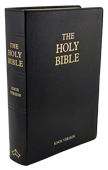The Holy Bible – Knox Translation
The Book of Esther
|
Chapter 9
|
1
So Adar came, the last month of the year, and the thirteenth day of Adar. All preparations had been made, by blood-thirsty enemies, for a massacre of the Jews on that day, but instead, the Jews had the better of them, and could set about avenging themselves.
2
City by city, town by town, region by region they banded themselves together, ready to strike the first blow against the men that hated and persecuted them. None dared withstand them, so wide-spread the fear their rise to power had engendered;
3
judge and governor and chieftain, ruler and administrator everywhere had no praise too high for the Jewish people, for dread of Mardochaeus;
4
did he not hold the first place at court, high in the royal favour? Every day his fame grew, and he was in all men’s mouths.
5
Great havoc the Jews wrought among their enemies that day, slaying the very men who had marked them down for slaughter;
6
in Susan alone they put five hundred men to death, not counting the ten sons of Aman the Agagite. Ten sons he had,
7
Pharsandatha, Delphon, Esphatha,
8
Phoratha, Adalia, Aridatha,
9
Phermestha, Arisai, Adirai and Jezatha;
10
all these they slew, and would take nothing of theirs for plunder.
11
And now, learning the number of those who had been killed at Susan,
12
the king said to the queen, In Susan alone the Jews have slain five hundred men, and Aman’s ten sons besides; here is massacre indeed, if in all my dominions they have done the like. Tell me, what more wouldst thou have me do for thee?
13
Please it the king’s grace, she answered, let the Jews be free to continue this day’s work to-morrow; and let the bodies of Aman’s sons be hanged on gibbets.
14
So the king gave orders as she asked. No sooner was the decree posted up, than gallows were made for the bodies of Aman’s sons;
15
and on the fourteenth day of Adar the Jews mustered afresh, killing three hundred citizens of Susan, but taking nothing of theirs for plunder.
16
All over the king’s dominions, the Jews fought for their lives, and put to death the enemies that persecuted them, till seventy-five thousand of them lay slain, and no plunder taken.
17
Everywhere it was on the thirteenth of Adar they began laying about them, and next day they slew no more; so it was this day, the fourteenth, they made into a holiday, to be observed thenceforward with feast, and rejoicing, and carousal.
18
In the city of Susan itself, the killing went on for two days; it was the fifteenth day, when their work was over, that they set apart for feasting and merry-making;
19
but in the unwalled towns and villages round about, carouse and rejoicing and the sharing out of dainties began on the fourteenth.
20
So Mardochaeus wrote to all the king’s Jewish subjects, near and far,
21
setting all this out and bidding them observe both the fourteenth and the fifteenth, year by year,
22
as the days of Jewry’s vengeance, when weeping and lament gave place to mirth and gladness. There was to be feasting on both days, and on both days rejoicing; dainties should be exchanged, and gifts made to the poor.
23
So the will they then had and the orders Mardochaeus sent became a yearly rite;
24
to recall how Amadathi’s son, Aman the Agagite, thought to vent his enmity against the Jews by murderously destroying them, and how he consulted Pur, the lot;
25
how Esther sought audience with the king, praying for a royal decree that should thwart his design, and make his malice fall on his own head; and how Aman and his sons went to the gallows.
26
This feast has ever been known as the feast of Purim, because of Aman’s lot-taking. Here in this letter, nay, this book you have been reading, the whole story has been set out, deeds done,
27
griefs borne, and strange vicissitudes. And the Jews pledged themselves and their children, with all who in after times should seek admission to their way of worship, to observe two days in each year, at the fixed time by this record determined.✻
28
Never must the observance die out with the passing of years, where there are Jews living in any part of the world; in every city the feast of Lots must be kept by the Jews, and by all those on whom their ancestral customs are binding.
29
There was a second letter written by queen Esther, Abihail’s daughter, and the Jew Mardochaeus, confirming this ordinance for ever;
30
it went out to all the Jews in the hundred and twenty-seven provinces of Assuerus’ realm, wishing them health and assuring them that they had her warrant
31
for keeping Purim feast with yearly rejoicing. And they, at the bidding of Mardochaeus and Esther, bound themselves and their children to keep it in mind; the fasting, and the cries for aid, the casting of the lots,
32
and all else that is recorded in this book, the book of Esther.


